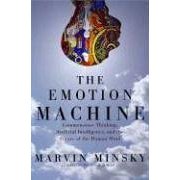Bibliography
Biography
People
Home
 A Minsky Bibliography
A Minsky Bibliography
An annotated list of some of Marvin's books and papers.
CD-ROM
Books
Downloadable Papers
- Communication with Alien Intelligence (html)
Reprinted from Extraterrestrials: Science and Alien Intelligence.
(Edward Regis, Ed.) Cambridge University Press, 1985.
Reprinted in Byte Magazine, April 1985
Two reasons why aliens will think like us, in spite of different origins.
- Causal Diversity (txt, html)
"Future of AI Technology," Marvin Minsky. Toshiba Review, Vol.47, No.7, July 1992. (Revised 95/07/10)
People often complain that AI is not developing as well as expected. In fact we are
still rapidly developing new useful systems for recognizing patterns
and for supervising processes.
- Why People Think Computers Can't (text)
First published in AI Magazine, vol. 3 no. 4, Fall 1982. Reprinted in
Technology Review, Nov/Dec 1983, and in The Computer Culture,
(Donnelly, Ed.) Associated Univ. Presses, Cranbury, NJ, 1985
Just as Evolution changed man's view of Life, Al will change mind's view
of Mind.
- Music Interview with Otto Laske (text)
Understanding Musical Activities: Readings in A.I. and
Music, The AAAI Press, Menlo Park, CA, 1991 Mira Balaban, Kemal
Ebcioglu, Otto Laske, Eds.
A conversation about music, its peculiar features as a human activity, the
special problems it poses for the scientist, and the suitability of AI
methods for clarifying and/or solving some of these problems.
- Matter, Mind and Models (text) (html)
Published in Semantic Information Processing MIT Press, 1968
(This version has some editorial simplifications made in 1995)
Why people become confused by questions about the relation between mental and physical events.
- Music, Mind, and Meaning (html)
AI memo 616, February 1981, 21 pages
Computer Music Journal, Fall 1981, Vol. 5, Number 3
Why do we like music? Our culture immerses us in it for hours each
day, and everyone knows how it touches our emotions, but few think of
how music touches other kinds of thought.
- Symbolic vs. Connectionist (html)
"Logical vs. Analogical or Symbolic vs. Connectionist or Neat vs. Scruffy",
in Artificial Intelligence at MIT., Expanding Frontiers, Patrick H. Winston
(Ed.), Vol 1, MIT Press, 1990. Reprinted in AI Magazine, 1991
Artificial Intelligence is not like circuit theory and electromagnetism.
Instead of looking for a unifying principle, the time has come to build systems
out of diverse components, some connectionist and some symbolic, each
with its own diverse justification.
- Afterword to Vernor Vinge's True Names (html)
In Vernor Vinge, True Names.
Whenever an
object's internal workings are too strange, complicated, or unknown
to deal with directly, we try to extract what parts of its behavior
seem familiar, and then represent them by familiar symbols.
- Inventing the Confocal Microscope (text)
(html)
Marvin Minsky, "Memoir on Inventing the Confocal Scanning Microscope,"
Published in Scanning, vol.10 pp128-138, 1988
This is what I remember about inventing the confocal scanning
microscope in 1955.
- Negative Expertise (text)
Published as "Negative Expertise," International Journal of Expert Systems, 1994,
Vol. 7, No. 1, pp. 13-19.
A "negative" way to seem competent is,
simply, never to make mistakes. How much of what we learn to do -- and learn to
think -- is of this variety? Many of the judgments that we traditionally
regard as positive -- such as beauty, humor, pleasure, and decisiveness -- may
actually reflect the workings of unconscious double negatives.
- Jokes and the Cognitive Unconscious
(text)
AI memo 603, November 1980, 25 pages
Published in Minsky, Marvin, "Jokes and their Relation to the Cognitive Unconscious."
In Cognitive Constraints on Communication,
Vaina and Hintikka (eds.) Reidel, 1981
Different forms of humor can be seen as much more similar, once we
recognize the importance of knowledge about knowledge and,
particularly, aspects of thinking concerned with recognizing and
suppressing bugs -- ineffective or destructive thought processes.
- Extra chapters to The Turing Option
(text)
Two unpublished sections, Chaps 25B and 26B, of The Turing
Option by Harry Harrison and Marvin Minsky, Warner Books, August
1992.
- Will Robots Inherit the Earth?(text,
html)
Published in Scientific American, Oct. 1994
Everyone wants wisdom and wealth. Nevertheless, our health often gives out before we achieve them. To lengthen our lives, and improve our minds, in the future we will need to change our our bodies and brains.
- A LISP Garbage Collector Algorithm Using Serial Secondary Storage
(postscript)
AI memo 58, October 1963, 4 pages
Also published as MAC-M-129.
- Artificial Intelligence Progress Report (postscript)
AI memo 252, January 1972, 137 pages
By Marvin Minsky and Seymour Papert
- A Framework for Representing Knowledge (html)
AI memo 306, June 1974
Also published in The Psychology of Computer Vision,
P.H. Winston (ed.), McGraw-Hill, NY, 1975.
Bibliography
Biography
People
Home
 A Minsky Bibliography
A Minsky Bibliography
 A Minsky Bibliography
A Minsky Bibliography